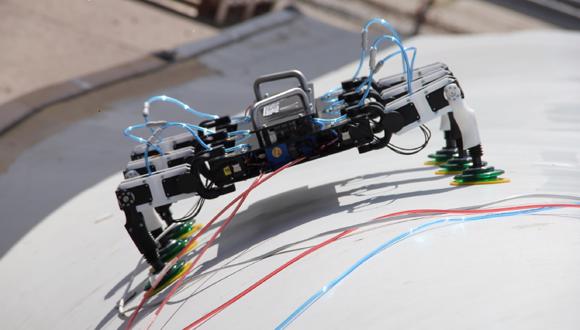Wed, 05 June, 2019
Plant Integrity Ltd, a wholly owned subsidiary of TWI, is leading the MIMRee project – Multi-Platform Inspection, Maintenance and Repair in extreme environments – that will develop a world-first, autonomous inspection and repair solution for offshore wind farms.
A consortium of organisations, from academic institutes to leaders in the engineering industry, are combining their expertise in robotics, artificial intelligence, marine and aerial engineering, nano-biotechnology and space mission planning to create unmanned robots capable of maintaining offshore wind farms. The eight partners making up the consortium are Plant Integrity, Thales, Catapult, Wootzano, Royal Holloway University of London, the University of Manchester, the University of Bristol and the Royal College of Art.
This £4m Innovate UK-funded project will build on existing innovations to improve the current wind turbine inspection and repair process. It currently involves human technicians working at height, on ropes, in extreme conditions, during restricted time windows. The project aims to improve this by creating a state-of-the-art system and is expected to save the average wind farm approximately £26m over the course of its lifetime.
“The moment when an autonomous mothership and robotic crew sail in UK waters will be a world-first – and likely a game-changer for the offshore, oil and gas and defence industries too. Some of the technologies are more fully-developed, such as the autonomous vessel, but robotics is at a more experimental stage. While the focus is on solving vital problems for the offshore wind industry, we’d expect to see a lot more insights and applications emerging as we test different combinations of mechanics, sensors and robotic intelligence.”
Martin Bourton, Principal Project Leader, Plant Integrity
A variety of systems will be united into a holistic solution, capable of planning, communicating, sharing data and working in unison on complex sequences of tasks. Each sequence will begin with an autonomous vessel that will initiate and plan missions, and map and scan wind turbine blades upon approach, to understand where the robots should be deployed. Then drones will be launched from the autonomous mothership to conduct visual inspection of the blades. Where a more detailed assessment is required, crawling robots will be transported onto the turbine to conduct hyper-spectral imaging inspection and repairs. An electronic skin will ‘feel’ the blade surface and ensure that the crawler is securely attached while moving on the blade.
Plant Integrity is a leader in non-destructive testing, and the team’s expertise will contribute towards the robots' capacity to carry out advanced inspections, such as hyper-spectral imaging and automated defect identification. The technology also has applications in both the offshore oil and gas and defence industries, giving the project partners the potential to position the UK as a world-leader in robotics and autonomous systems development.
Watch the project video to find out more.
 The BladeBUG robot
The BladeBUG robot